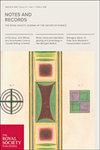2016 Wilkins–Bernal–Medawar lecture The curious history of curiosity-driven research
IF 0.6
3区 哲学
Q3 HISTORY & PHILOSOPHY OF SCIENCE
Notes and Records-The Royal Society Journal of the History of Science
Pub Date : 2017-12-20
DOI:10.1098/rsnr.2017.0034
引用次数: 8
Abstract
Curiosity has a curious place in the history of science. In the early modern period, curiosity was doubled-edged: it was both a virtue, the spring for a ‘love of truth’, but also the source of human error and even personal corruption. In the twentieth century, curiosity had become an apparently uncomplicated motivation. Successful scientists, for example Nobel Prize winners in their lectures and biographies, frequently attributed their first steps into science to a fundamental curiosity, an irrepressible desire to ask the question ‘why?’. The aside made by Albert Einstein in private correspondence in 1952—‘I have no special talents. I am only passionately curious’—has now become a meme. Yet in the twentieth century, science was shaped by many forces, and the practical utility of science in the real, messy problematic worlds of its formation seem far removed from the seeming innocence of curiosity-driven research. In my lecture and this paper, I ask why scientists say they ask ‘why?’, and trace the curious history of the idea of curiosity-driven science. In particular, I distinguish between a long and short history of curiosity in science, with the latter associated with the term ‘curiosity-driven science’ and the UK administration of Margaret Thatcher.2016 Wilkins–Bernal–Medawar讲座好奇心驱动研究的好奇历史
好奇心在科学史上有着奇特的地位。在现代早期,好奇心是双重的:它既是一种美德,是“热爱真理”的源泉,也是人类错误甚至个人腐败的根源。在二十世纪,好奇心显然已成为一种简单的动机。成功的科学家,例如诺贝尔奖获得者在他们的讲座和传记中,经常将他们进入科学的第一步归因于一种基本的好奇心,一种不可抑制的问“为什么?”的欲望。阿尔伯特·爱因斯坦在1952年的私人信件中说:“我没有什么特殊的才能。“我只是充满好奇”——现在已经成为一个迷因。然而,在二十世纪,科学是由多种力量塑造的,科学在其形成的真实、混乱、有问题的世界中的实用性似乎与好奇心驱动的研究的天真无邪相去甚远。在我的讲座和这篇论文中,我问科学家为什么说他们问“为什么?”,追溯好奇心驱动科学思想的奇特历史。特别是,我区分了科学好奇心的长期和短期历史,后者与“好奇心驱动的科学”一词和玛格丽特·撒切尔的英国政府有关。
本文章由计算机程序翻译,如有差异,请以英文原文为准。
求助全文
约1分钟内获得全文
求助全文
来源期刊
CiteScore
1.50
自引率
0.00%
发文量
45
审稿时长
>12 weeks
期刊介绍:
Notes and Records is an international journal which publishes original research in the history of science, technology and medicine.
In addition to publishing peer-reviewed research articles in all areas of the history of science, technology and medicine, Notes and Records welcomes other forms of contribution including: research notes elucidating recent archival discoveries (in the collections of the Royal Society and elsewhere); news of research projects and online and other resources of interest to historians; essay reviews, on material relating primarily to the history of the Royal Society; and recollections or autobiographical accounts written by Fellows and others recording important moments in science from the recent past.

 求助内容:
求助内容: 应助结果提醒方式:
应助结果提醒方式:


